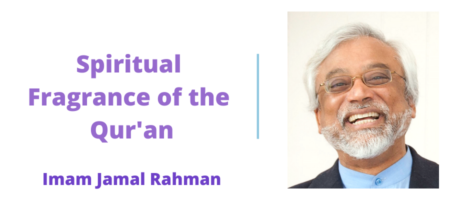By Sally Jo Gilbert de Vargas
“Bow down in adoration and draw closer to Allah.” (Qur’an 96:19)
“Recite what is sent of the Book to you, and establish regular prayer. For prayer restrains from shameful and unjust deeds, and remembrance of God is surely the greatest thing in life. And God knows well all that you do.”
~Qur’an 29:45
Prayer is common in all religious traditions and takes many forms. In Islam, regular daily prayers are a central practice (one of the five Pillars of Islam). The Qur’an states clearly the purpose of prayer is to turn our hearts and minds closer to our Creator and to draw us towards the Good. When we pray to God, we enter into conversation with Divinity within and without. We offer praise and thanksgiving to our Creator and Sustainer, and we cry out to Allah for guidance and help. In return, Allah listens and calls back to us with Guidance and Mercy.
“And when My servants ask you concerning Me, then surely I am near; I answer the prayer of the supplicant when he calls on Me, so they should answer My call and believe in Me that they may walk in the right way.” (Qur’an 2:186)
Allah does not, however, promise to answer our supplications with exactly what we ask for! He explains, “But it is possible that ye dislike a thing which is good for you, and that ye love a thing which is bad for you. But God knows, and you know not.(Qur’an 2:216) Nevertheless, if we pray to Allah with trust in our heart and a sincere desire to receive God’s Guidance and Mercy, it will be given to us.

Prayer is a form of Remembrance. It is a way to clear our minds of extraneous attachments to everyday worries and distracting thoughts. I have found that nothing brings me out of a bad mood or an anxious or depressed state faster than a prayer cycle. Although Muslims use the body prayer of standing, bowing, kneeling, and prostrating on a regular schedule throughout the day and into the night, we are also asked to remain “steadfast in prayer,” and “celebrate God’s praises,” which I interpret as meaning we should strive to be in Remembrance of God at all times throughout the day and even into the night. For me this is a particularly powerful practice when I am taking a walk in nature, noticing the infinite beauty and majesty of God’s Creation, reading a sacred text which illuminates God’s mystery, when I am listening to beautiful music, and when I am writing in my journal, searching for guidance on difficult issues in my life. I consider all of these activities forms of prayer and remembrance. In fact, my ultimate goal is to make everything I think, say and do be a form of prayer and remembrance. Surely this is indeed, “the greatest thing in life!”
What form does prayer take in your life?

